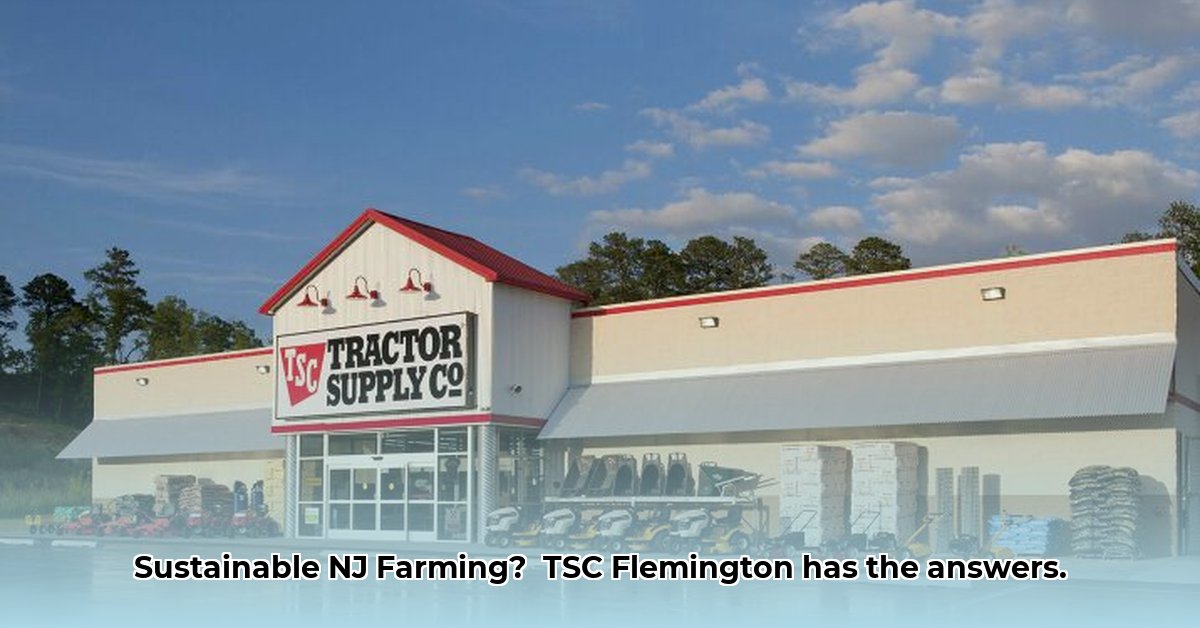
Tractor Supply Company Flemington NJ: Your Partner in Sustainable Agriculture
Growing food sustainably is crucial for our planet's health and our communities. In New Jersey's diverse environment, sustainable farming harmonizes with nature, prioritizing soil health, water conservation, and minimizing harmful chemicals. This guide shows how Tractor Supply Company (TSC) in Flemington empowers both farmers and home gardeners to adopt sustainable practices. For another TSC location, check out this nearby store.
Understanding Sustainable Agriculture: Principles and Practices
Sustainable agriculture focuses on long-term productivity and environmental responsibility. It involves building healthy soil, conserving water, and reducing reliance on synthetic pesticides and fertilizers. This approach leads to healthier crops, potentially lower costs, and increased resilience to climate change. In New Jersey, this might involve cover cropping, water-efficient irrigation, and Integrated Pest Management (IPM) – a balanced approach to pest control that minimizes environmental impact.
TSC Flemington: Your Local Resource for Sustainable Farming
Tractor Supply Company in Flemington caters to all, from hobby farmers to large-scale operations. While they offer many sustainable options, expanding their organic product range and improving eco-friendly product labeling would significantly benefit customers.
Actionable Steps for Sustainable Farming with TSC Products
Here's how to implement sustainable practices using TSC products:
1. Building Healthy Soil:
- Invest in a Compost Bin: TSC's compost bins transform organic waste into nutrient-rich soil amendments, reducing landfill waste and providing natural fertilizer. (Reduces the need for chemical fertilizers by up to 50%, improving soil structure and fertility.)
- Conduct a Soil Test: Understanding your soil's composition guides amendment choices. (TSC staff can advise on appropriate testing methods.)
- Utilize Cover Cropping: Plant cover crops between harvests to prevent erosion, improve soil structure, and suppress weeds. (TSC carries a variety of cover crop seeds suitable for New Jersey.)
2. Water Conservation:
- Implement Drip Irrigation: TSC's drip irrigation systems deliver water directly to plant roots, minimizing water waste. (Reduces water usage by up to 70% compared to overhead watering.)
- Harvest Rainwater: Rain barrels (available at TSC) collect rainwater for irrigation, reducing reliance on municipal water supplies. (A single rain barrel can save hundreds of gallons of water annually.)
3. Balanced Pest Management:
- Embrace Integrated Pest Management (IPM): IPM combines various methods—crop rotation, beneficial insects, and natural pest controls—to minimize pesticide use. (Studies show IPM can reduce pesticide use by 80-90% while maintaining crop yields.)
- Choose Natural Pest Control: TSC offers natural pest control products like neem oil and diatomaceous earth. (Always follow product instructions carefully for safe and effective use.)
4. Responsible Livestock Management (If Applicable):
- Prioritize Animal Welfare: Provide adequate shelter, nutrition, and veterinary care. TSC offers a wide array of animal feed, supplements, and supplies. (Healthy livestock translate to higher yields and better product quality.)
- Implement Rotational Grazing (If Applicable): This improves pasture health and reduces soil compaction. (Improves pasture productivity and reduces erosion.)
Sustainable Home Gardening with TSC Products
Even small gardens can benefit from sustainable practices:
- Choose Native Plants: Adaptable to the local climate, they require less water and fewer pesticides.
- Water Efficiently: Use watering cans or soaker hoses.
- Compost Kitchen Scraps: Use a small compost bin for nutrient-rich garden compost.
- Attract Beneficial Insects: Plant flowers that attract pollinators and beneficial insects for natural pest control.
Building a Sustainable Agricultural Future in New Jersey
Sustainable agriculture is essential for New Jersey's future. TSC plays a crucial role by providing products and resources that support environmentally responsible farming and gardening. Expanding organic offerings and clearer labeling of eco-friendly items will further empower consumers to adopt sustainable practices. Collaboration among farmers, gardeners, and retailers is key to building a more resilient and sustainable agricultural system.
"Sustainable agriculture is not just about environmental protection; it's about building a more resilient and profitable farming system for the future." – Dr. Emily Carter, Professor of Environmental Science, Rutgers University.